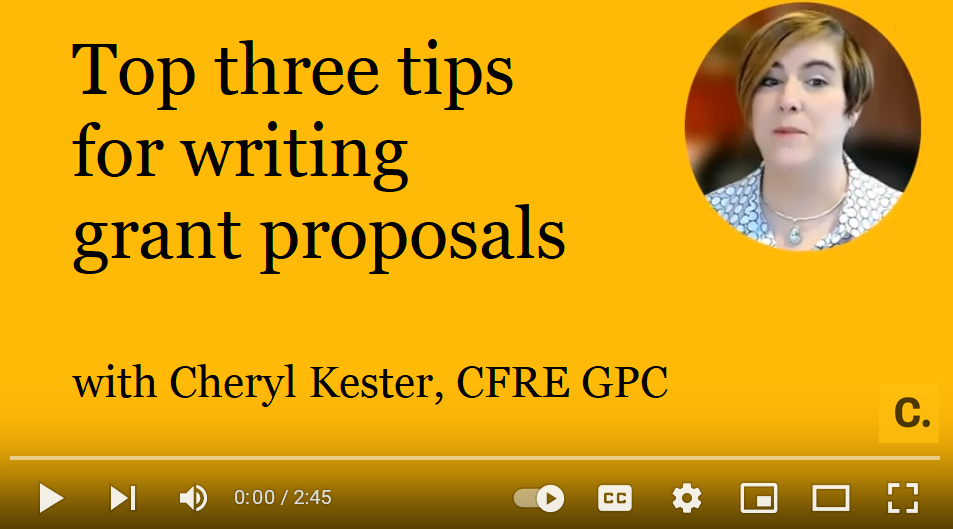Top three tips for writing grant proposals

It’s frustrating. I know. It seems like you have to answer the same questions over and over in every grant proposal. And in longer government proposals, sometimes it seems like you have to answer the same question twice right in the same application!
So, what’s the best way to stay organized while keeping your content fresh? In the video below, you’ll find three top tips to do just that when writing grant proposals.
For more grant-related guidance, check out Government Grants 101: Readiness, Research, and Writing the Proposal, an eLearning course I created with Candid. In this two-part course you’ll learn how to assess your organization’s readiness to apply for government grants, research grant opportunities, determine whether you should apply for a particular grant, and get tips for developing the content that reviewers are looking for.
If you want to delve even deeper into government proposal writing, check out my books: Writing to Win Government Grants: A Must-Have for your Fundraising Toolbox and Writing to Win Government Grants: The Workbook.
Transcript:
Writing grant proposals is a time-intensive process, and it can often feel repetitive. I know, I’ve been there! So here are three tips for staying organized while keeping your proposal content fresh.
Tip number one: keep basic facts in an easy-to-access place. A great place to start is your organization’s Candid profile.
In this profile, you can store key information such as the year the organization was founded, your mission statement, your financials, a list of your board of directors, and descriptions of key programs.
Bonus: Not only does keeping this information in your Candid profile current give you information to use for multiple grant proposals, but it presents a positive public face to your donors and funders. Funders do look at these profiles when making funding decisions.
Tip number two: Even though proposal questions may seem exactly the same, pay attention to nuance or slight wording differences. For example, Funder A may have a question that says “describe your location and the populations you serve.” Funder B may have a question that says “describe your location and how you reach underserved populations.” Although these are both asking questions about populations, your response to Funder B is going to have a different emphasis than your response to Funder A. Addressing these types of nuances acknowledges funder priorities and it’s going to make your application stand out from the competition.
Tip number three: For content that’s more than basic facts, develop a system for keeping track of frequently-used information. You could store all of your previous proposals in a proposal “library” on a shared drive. Some people prefer to have a spreadsheet with a different tab for each commonly asked question. For others it’s as simple as creating one document for, say, “the sustainability question,” and dumping into there most of your recent responses to that question so you can use them in future applications.
Whatever technique you use, the key is knowing how to use and update previous content. Resist the urge to copy and paste and call it done, especially if you’re going back to the same funder year after year.
Copying and pasting, updating, and tweaking is a best practice.
Finding for yourself this balance between not reinventing the wheel while addressing each funder’s precise question will save you time and energy and lead to better proposals in the long run.
For more tips on seeking grants for your nonprofit—and specifically government grants—check out Government Grants 101: Readiness, Research, and Writing the Proposal, an eLearning course I created with Candid. We’ll drop a link to the course at the end of this video.
May all of your grants be winning grants!








Kate, Digital Communications Manager, Candid says:
Thanks! Here are more resources to get you started: https://learning.candid.org/resources/knowledge-base/sort/popularity_desc_num/topic/proposal-writing/
You can also reach out to our team for help at https://learning.candid.org/ask-us/
David Arnett says:
These tips are very helpful thank you. I am seeking a grant to replace a boiler and water heater in a church in a small town in central N.Y. I have never done one. Don’t know who to send it to or if I should send a letter request first. Where do I get the grant forms also. Any advice would be appreciated.
Thank You,
Dave
Kate, Digital Communications Manager, Candid says:
Thanks for reaching out! You can find lots of grant writing resources, including sample documents, in our Knowledge Base. You can also reach out to our team using "Ask Us" on that page for more advice and guidance.
Pat says:
Hi Charyl,
My name is Patrick O'Donnell. I am a sergeant with UC Berkeley Police Department (UCPD) and I am trying to teach myself how to write a grant for our department. I truthfully do not know where to even start or turn it in?
Kate Meyers Emery says:
So glad to hear this was helpful! If you're looking to get more tips, check out our Candid Learning resources.
Beverly Young says:
I appreciate the three tips very much. I think I've made the task of grant writing drudgery instead of figuring a way to organize it so I won't have that attitude. It is certainly not my favorite thing to do; maybe the tips will help change that.
Beverly Young
Executive Director
Work Activity Center, Inc.
Mary Steyer says:
Hello David, we're sorry for this inconvenience. You can chat with our support team through our Ask Us page, https://learning.candid.org/ask-us/, or email [email protected] for help.
David Leveron says:
I already paid for this training, but I can't seem to be able to access it. Can you help?